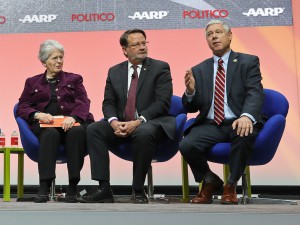
Joan Claybrook (left) during a panel discussion in Detroit said she doesn't trust autonomous vehicles and they should be tightly regulated.
Self-driving cars are not yet roadworthy and could pose a lethal threat to motorists unless they are carefully regulated said Joan Claybrook, the former chief of the National Highway Transportation Safety Administration and longtime critic of the auto industry’s safety record.
“The excitement around autonomous cars is very interesting, we have had massive problems with failures in the auto industry with airbags and with the GM ignition switch and they have killed people,” Claybrook said during a panel discussion on Autonomous Vehicles and regulation held as part of Automobili-D sponsored by Politico and held in conjunction with the North American International Auto Show.
In addition, for a long time to come what NHTSA has deemed as Level 3 autonomous vehicles that can cruise on auto pilot under certain circumstances but require driver intervention in an emergency situation, will mix with conventional vehicles on streets and highways.
“Autonomous vehicles follow a very rigid path. Drivers don’t, which is one of the reasons you see autonomous vehicles getting into collisions at intersections,” she added.
Consequently, all autonomous vehicles will require systems to protect passengers. But the pending legislation would specifically weaken the current federal safety mandates, added Claybrook, who noted surveys show that consumers remain skeptical about autonomous vehicles.
(Convince autonomous vehicles are good, Chao tells automakers. Click Here for the story.)
Claybrook was also skeptical about a recent experiment by the Ford Motor Co., which used an autonomous vehicle to deliver a pizza. “Who is going to want to run out and get a pizza in the rain,” she said. “But that’s what you would have to do if the restaurant was using an automated vehicle for deliveries.”
Over the years, the auto industry has been reluctant to implement less complex safety feature, such as an alarm that warned someone they were about to leave a child in a vehicle, she said. “They have an alarm that went off if you left your keys in the ignition but they wouldn’t use similar technology to alert you if a child was in the car.”
The technology behind autonomous vehicles is very complex and remains unproven. It will requires a great deal of research but the new legislation pending in Congress doesn’t include additional resources need to monitor its development and implementation, she added.
Rep Fred Upton, R-Mich., who was on the panel with Claybrook, noted the legislation authorizing vehicles to travel on public roads is separate from Congressional process appropriations. They are separate issue, he said. But he would certainly support providing NHTSA with additional resources necessary to monitor the development of autonomous vehicles.
(Click Here to see Trump’s guidelines on autonomous testing.)
Sen. Gary Peters, D-Mich., one of the sponsors of the legislation in the Senate, which has yet to approve the bill, said that one of the overriding objectives of the bill is to make sure the U.S. is on the leading edge of the changes overtaking the transportation industry. One hundred years ago the advent of the automobile completely transportation around the world.
“Cars changed everything about our society,” he said.
Advanced technology, artificial intelligence and machine learning are rapidly changing the sector again and the advances also have the potential to eliminate accidents and reduce highway deaths.
“Thirty years from now, it may seem barbaric that we let (traffic accidents) go on,” Peters said.
“We better allow some of this technology to move forward and create a space for innovation,” added Peters, who noted the U.S. is competing against other global regions for leadership on autonomous vehicle development.
Upton also said safety needs to be a top priority and predicted consumers – especially the elderly and others who need more mobility options – will embrace autonomous vehicles when they are introduced to the mass market.
(More automakers adding lifesaving braking equipment. Click Here for the story.)
Both Peters and Upton, in a rare display of bi-partisan comity, dismissed the idea that Michigan and the rest of the Midwest is in some kind of competition with California’s Silicon Valley. “Neither can do it by themselves,” said Upton.

Anyone who would trust their lives to software, wiring harnesses, and sensors has no experience with software, wiring harnesses, and sensors. Any autonomous vehicle on public roads needs an indicator (rooftop blue flashing light??) warning other cars to expect the unexpected.
Think about the jockeying that takes place at a four way stop. You go, no, you go, the hell with all of you, I’m going!
What’s going to happen when the autonomous CPU detects a sensor failure? It can’t just stop in the middle of the road, but with a failed sensor it can’t pull over to the side of the road because that sensor may be the one that detects traffic on the side of the vehicle.
What happens if/when there is a fatality? Are all like vehicles allowed on the road or are they grounded until root cause is determined and corrective action implemented? For relatively simple issues, that takes weeks to months. Meanwhile old Betsy is parked in the garage.
Will/should OEMs have the power to remotely disable a vehicle that is under investigation or hasn’t gone in for a mandatory recall? Hell yes.
All this so some damn millennial can text while they should be driving! Give me a break!
Have you tried to deal with a four-way stop when four cars are there and none (okay, the other three) don’t know the rules? And those Millennials will text, anyway.
The technology is coming, like it or not. (Though, if you ask folks deep inside the industry and they’re honest enough they will tell you that Level 4 & 5, driverless technology is largely being driven by the ride-sharing services as they see that as the formula that will transform their business.)
Paul E.